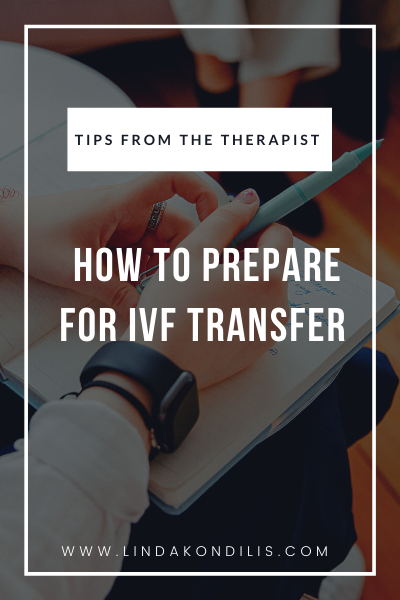How to Prepare for IVF Transfer -Tips from the Therapist
Preparing physically and mentally for in vitro fertilization (IVF) does take a conscious effort. With so many moving parts, objectives to remember, and treatment protocols to follow during the process, it can be easy to feel overwhelmed. Plus, the anticipatory anxiety of fertility treatments and possibly facing fertility treatment failures of the past can add a complicated layer to the situation. Here are a few key pointers to help you get prepared for IVF transfer, whether this is a first or concurrent attempt.
Gain Clarity from Your Healthcare Team
If this will be your first IVF treatment, don't be shy about asking questions. Your healthcare team will be happy to make sure you are fully clear on what to expect, what your role should be in the process, and things to avoid. The more you discuss everything with your caregivers, the more prepared you will be throughout IVF transfer.
Obtain or Make a Treatment Protocol Calendar
Your reproductive treatment team may provide you a treatment protocol calendar, which lays out things like when to take medications, when eggs will be retrieved, and what day the actual transfer will take place. This calendar can be like your roadmap to follow throughout IVF transfer, so even if one is not provided, go ahead and make one for yourself. Here is an example IVF protocol calendar.
Enlist the Help of Those Who Can Offer Support
IVF treatment can be time-consuming and emotionally overwhelming at times. Your support system will mean everything to your sanity in the process. Consider what you can remove from your plate during the transfer phase to de-stress the situation. You may want to allocate meal planning to your partner, for example, or enlist a close friend to help you with running errands. If you have just a few people helping take some things off your plate, you will have more free time to relax, focus on your own health, and rest.
Plan Things to Support Your Mood
Mood-altering drugs can be the norm during IVF transfer. You may feel emotionally unstable at times due to changing hormone levels and the emotions of the treatment. While you may not be able to control those factors, you can do other things to support a stable mood. A few ideas:
Make sure you follow a healthy sleep pattern
Try to eat a well-balanced diet with ample omega-3 fatty acids, selenium, and probiotics
Pencil in time for sunshine or a little light activity outdoors
Another note, make sure your significant other knows that your communication skills and mood may be a little off for the short term. Do what you can to take care of major decisions or emotionally charged conversations before the IVF transfer.
Get Prepared with Healthy Distractions
If you are especially active, you may have to adjust your schedule and activity levels at times. Make sure you find a few replacement activities that can offer intellectual or creative stimulation instead. Likewise, it will be helpful to have a few healthy distractions ready to go if you find yourself focusing too intently on the outcome of the transfer. For example, maybe you can plan a movie night with your partner or take a pottery class.
